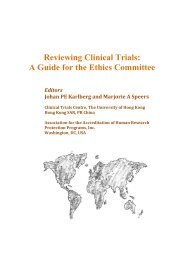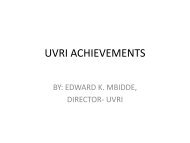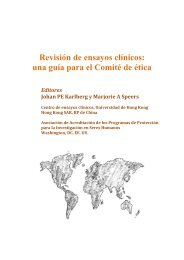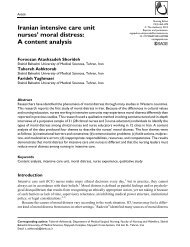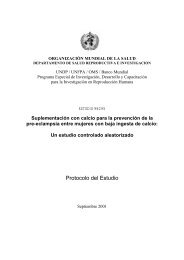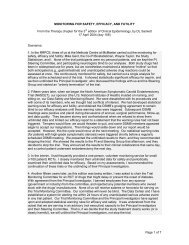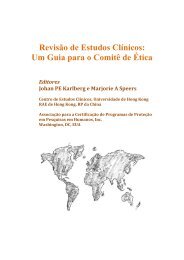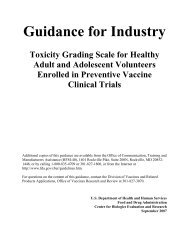ecause they can be more easily induced to participate in exchange for small payments. In mostcases, these people would be called upon to bear the burdens of research so that others who arebetter off could enjoy the benefits. However, although the burdens of research should not falldisproportionately on socio-economically disadvantaged groups, neither should such groups becategorically excluded from research protocols. It would not be unjust to selectively recruit poorpeople to serve as subjects in research designed to address problems that are prevalent in theirgroup – malnutrition, for example. Similar considerations apply to institutionalized groups or thosewhose availability to the investigators is for other reasons administratively convenient.Not only may certain groups within a society be inappropriately overused as research subjects, butalso entire communities or societies may be overused. This has been particularly likely to occur incountries or communities with insufficiently well-developed systems for the protection of the rightsand welfare of human research subjects. Such overuse is especially questionable when thepopulations or communities concerned bear the burdens of participation in research but areextremely unlikely ever to enjoy the benefits of new knowledge and products developed as a resultof the research. (See Guideline 10: Research in populations and communities with limited resources.)Guideline 13: Research involving vulnerable personsSpecial justification is required for inviting vulnerable individuals to serve as research subjectsand, if they are selected, the means of protecting their rights and welfare must be strictly applied.Commentary on Guideline 13Vulnerable persons are those who are relatively (or absolutely) incapable of protecting their owninterests. More formally, they may have insufficient power, intelligence, education, resources,strength, or other needed attributes to protect their own interests.General considerations. The central problem presented by plans to involve vulnerable persons asresearch subjects is that such plans may entail an inequitable distribution of the burdens andbenefits of research participation. Classes of individuals conventionally considered vulnerable arethose with limited capacity or freedom to consent or to decline to consent. They are the subject ofspecific guidelines in this document (<strong>Guidelines</strong> 14,15) and include children, and persons whobecause of mental or behavioural disorders are incapable of giving informed consent. Ethicaljustification of their involvement usually requires that investigators satisfy ethical reviewcommittees that:• the research could not be carried out equally well with less vulnerable subjects;• the research is intended to obtain knowledge that will lead to improved diagnosis,prevention or treatment of diseases or other health problems characteristic of, or unique to,the vulnerable class– either the actual subjects or other similarly situated members of thevulnerable class;• research subjects and other members of the vulnerable class from which subjects arerecruited will ordinarily be assured reasonable access to any diagnostic, preventive ortherapeutic products that will become available as a consequence of the research;
• the risks attached to interventions or procedures that do not hold out the prospect of directhealth-related benefit will not exceed those associated with routine medical or psychologicalexamination of such persons unless an ethical review committee authorizes a slight increaseover this level of risk (Guideline 9); and,• when the prospective subjects are either incompetent or otherwise substantially unable togive informed consent, their agreement will be supplemented by the permission of theirlegal guardians or other appropriate representatives.Other vulnerable groups. The quality of the consent of prospective subjects who are junior orsubordinate members of a hierarchical group requires careful consideration, as their agreement tovolunteer may be unduly influenced, whether justified or not, by the expectation of preferentialtreatment if they agree or by fear of disapproval or retaliation if they refuse. Examples of suchgroups are medical and nursing students, subordinate hospital and laboratory personnel, employeesof pharmaceutical companies, and members of the armed forces or police. Because they work inclose proximity to investigators, they tend to be called upon more often than others to serve asresearch subjects, and this could result in inequitable distribution of the burdens and benefits ofresearch.Elderly persons are commonly regarded as vulnerable. With advancing age, people are increasinglylikely to acquire attributes that define them as vulnerable. They may, for example, beinstitutionalized or develop varying degrees of dementia. If and when they acquire suchvulnerability-defining attributes, and not before, it is appropriate to consider them vulnerable and totreat them accordingly.Other groups or classes may also be considered vulnerable. They include residents of nursing homes,people receiving welfare benefits or social assistance and other poor people and the unemployed,patients in emergency rooms, some ethnic and racial minority groups, homeless persons, nomads,refugees or displaced persons, prisoners, patients with incurable disease, individuals who arepolitically powerless, and members of communities unfamiliar with modern medical concepts. Tothe extent that these and other classes of people have attributes resembling those of classesidentified as vulnerable, the need for special protection of their rights and welfare should bereviewed and applied, where relevant.Persons who have serious, potentially disabling or life-threatening diseases are highly vulnerable.Physicians sometimes treat such patients with drugs or other therapies not yet licensed for generalavailability because studies designed to establish their safety and efficacy have not been completed.This is compatible with the Declaration of Helsinki, which states in Paragraph 32: " In the treatmentof a patient, where proven…therapeutic methods do not exist or have been ineffective, the physician,with informed consent from the patient, must be free to use unproven or new… therapeuticmeasures, if in the physician’s judgement it offers hope of saving life, re-establishing health oralleviating suffering". Such treatment, commonly called 'compassionate use', is not properlyregarded as research, but it can contribute to ongoing research into the safety and efficacy of theinterventions used.Although, on the whole, investigators must study less vulnerable groups before involving morevulnerable groups, some exceptions are justified. In general, children are not suitable for Phase Idrug trials or for Phase I or II vaccine trials, but such trials may be permissible after studies in adultshave shown some therapeutic or preventive effect. For example, a Phase II vaccine trial seekingevidence of immunogenicity in infants may be justified when a vaccine has shown evidence ofpreventing or slowing progression of an infectious disease in adults, or Phase I research withchildren may be appropriate because the disease to be treated does not occur in adults or ismanifested differently in children (Appendix 3: The phases of clinical trials of vaccines and drugs).




